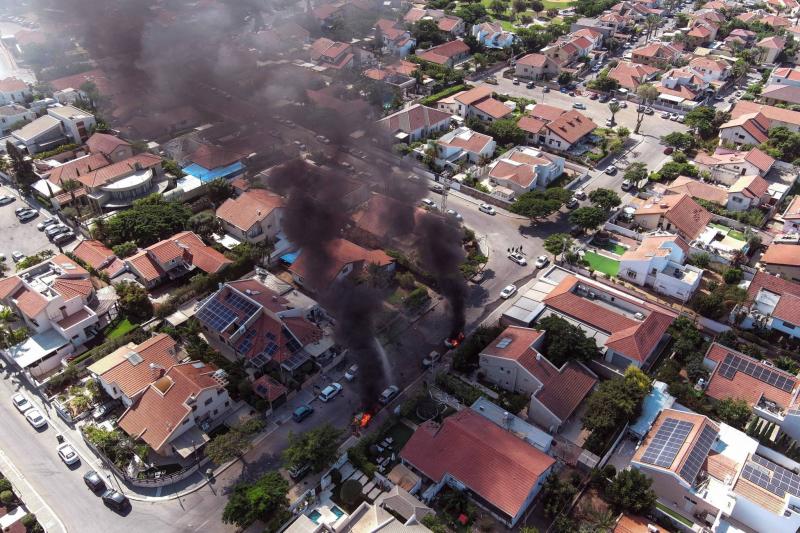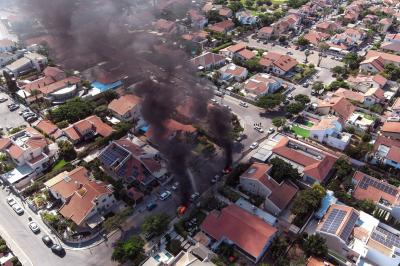The "Wall Street Journal" reported today, Monday, that Iran assisted in planning Hamas's attack on Israel, which resulted in the deaths of at least 700 people and gave the green light for the attack during a meeting in Beirut last Monday, stating: "The Islamic Revolutionary Guard designed a ground, air, and naval assault that left the Middle East on the brink of a total war."
The "Wall Street Journal" added: "The official green light for the attack is said to have been given during a meeting on Monday in Beirut. Since then, Israeli Prime Minister Benjamin Netanyahu has described Iran as a terrorist state." It further noted: "It is believed that four other military groups supported by Iran were present at the meeting, including members of Hamas and Hezbollah."
In the first comment from an American official to the "Wall Street Journal," the official said: "We currently have no information to confirm this narrative," but the newspaper pointed out that a senior Hamas official stated in a statement that they acted alone, saying: "This is a Palestinian decision, and Hamas."
Who Attended the Meeting?
The newspaper stated: "Nonetheless, a European official and an advisor to Syria provided the same narratives that others said—that this was planned in coordination. Sources reported that members of each group met with a branch of the Iranian Revolutionary Guard every two weeks since at least August to plan the attack. Attendees included the military commander of the Iranian Revolutionary Guard, Ismail Qaani, Hezbollah leader Hassan Nasrallah, Islamic Jihad leader Ziad al-Nakhalah, and the military commander of Hamas, Saleh al-Arouri. Iranian Foreign Minister Hossein Amir-Abdollahian attended two of the meetings. Qaani was a prominent figure in attempts to bolster its influence in the region."
The newspaper quoted Lieutenant Colonel Jonathan Conricus, spokesman for the Israeli Defense Forces, stating: "Without Iran’s funding, weapons, training, direction, and political incitement, Hamas would not have the capability or the capacity."
The newspaper revealed that one of the missing is British soldier Jake Marlowe (26 years old), who has not been heard from since Saturday morning after working with a security team at a festival near Re'im, a village close to the border with Gaza in southern Palestine.
Gaza Wars
The article reviewed the wars that have devastated Gaza over the years: "Gaza has been destroyed due to four wars and countless skirmishes between Hamas and Israel since militants took control of the territory in 2007. However, the scenes of violence within Israel itself have gone beyond anything witnessed there even at the height of the Palestinian intifadas in past decades. The fact that Israel was caught off guard represented one of the worst intelligence failures in its history, and a shock to a nation that prides itself on its intensive penetration and monitoring of militants.”
It continued: "The timeline is as follows, starting with the Israeli withdrawal from Gaza in 2005, and detailing the major escalation in the conflict between Israel and Palestinian factions in the densely populated coastal strip, home to 2.3 million people:
- August 2005: Israeli forces unilaterally withdraw from Gaza after 38 years in the Middle East War, evacuating settlements and leaving the territory under the control of the Palestinian Authority.
- January 25, 2006: The Islamic Hamas movement wins a majority of seats in the Palestinian legislative elections. Israel and the United States cut off aid to the Palestinians because Hamas refuses to renounce violence and recognize Israel.
- June 25, 2006: Hamas militants capture Israeli army conscript Gilad Shalit in a cross-border raid from Gaza, leading to Israeli airstrikes and incursions. Shalit was eventually released after more than five years in a prisoner exchange.
- June 14, 2007: Hamas takes control of Gaza in a brief civil war, ousting Fatah forces loyal to Palestinian President Mahmoud Abbas, who is based in the West Bank.
- December 27, 2008: Israel launches a 22-day military assault on Gaza after Palestinians fire rockets at the southern Israeli town of Sderot. Reports indicate around 1,400 Palestinians and 13 Israelis were killed before a ceasefire agreement was reached.
- November 14, 2012: Israel kills Hamas military chief Ahmed Jabari, leading to eight days of Palestinian rocket fire and Israeli airstrikes.
- July-August 2014: The kidnapping and murder of three Israeli teenagers by Hamas trigger a seven-week war in which over 2,100 Palestinians in Gaza and 73 Israelis, 67 of whom were military personnel, were killed.
- March 2018: Palestinian protests begin at the fenced Gaza-Israel border. Israeli forces open fire to prevent demonstrators from returning. Over 170 Palestinians were killed over several months of protests, which also led to fighting between Hamas and Israeli forces.
- May 2021: Following weeks of tension during Ramadan, hundreds of Palestinians are injured in clashes with Israeli security forces at the Al-Aqsa Compound in Jerusalem, the third holiest site in Islam. After Israel calls for the withdrawal of security forces from the compound, Hamas launches a barrage of rockets from Gaza at Israel. Israel responds with airstrikes on Gaza. Fighting continues for 11 days, resulting in at least 250 deaths in Gaza and 13 in Israel.
- August 2022: At least 44 people, including 15 children, are killed in three days of violence that began when Israeli airstrikes hit a senior commander of the Islamic Jihad Movement. Israel states that the strikes were preemptive against an imminent attack by the Iran-backed group and targeted leaders and weapons depots. In response, the Islamic Jihad launched over 1,000 rockets toward Israel.
- January 2023: The Islamic Jihad in Gaza fires two rockets toward Israel after Israeli forces raid a refugee camp and kill seven Palestinian militants and two civilians. The rockets trigger alarms in Israeli communities near the border but cause no injuries. Israel responds with airstrikes on Gaza.
- October 2023: Hamas launches the largest attack on Israel in years from Gaza, a surprise assault involving militants crossing the border with a heavy barrage of rockets. The Islamic Jihad states that its fighters joined the attack. Following the recent assault, the Israeli army announced that it is on high alert for war, adding that it has carried out strikes targeting Hamas in Gaza and called up reserve soldiers."
Iran Denies Involvement
After information emerged about the involvement of some of its officials in preparing for the attack launched by Palestinian factions early Saturday, penetrating from the Gaza Strip into Israeli settlements, the Iranian mission to the United Nations denied Tehran's involvement in the "Al-Aqsa Flood" attack as named by the Palestinian factions.
In a statement issued on Sunday evening, it considered that "the decisive actions taken by Palestine constitute entirely legitimate defense against seven decades of oppressive occupation and horrific crimes committed by the illegitimate Zionist regime."
It emphasized its "unwavering support for Palestine," but clarified that it did not participate in the Palestinian response. Furthermore, it deemed that "the success of Hamas's operation was due to the element of surprise, which represents the biggest failure of Israeli security agencies," according to its statement. It stated that "Israelis are struggling to justify their failure and attribute it to Iranian intelligence capabilities and operational planning." It also noted that Tel Aviv "finds it extremely difficult to accept what is circulating in intelligence agencies about their defeat at the hands of a Palestinian group," as reported by Reuters. It is worth noting that Iran has never concealed its support for Hamas and its funding and arming of it and the Islamic Jihad Movement.




